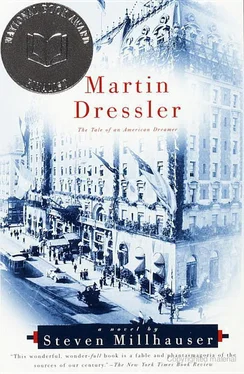“Exactly what I was thinking,” Martin said, and placed his hand on the Indian’s shoulder. “Old fellow, you’re about to move uptown.”
One week later the new Indian, with his brightly painted headdress and his emerald-green tunic, stood before the cigar stand in the lobby of the Vanderlyn Hotel, holding out in one hand a bundle of pinewood cigars. To the handle of the upright tomahawk was attached a white sign that announced in large red letters: GRAND OPENING. The washed and sparkling display case was filled with an entirely new selection of expensive and medium-priced cigars. Before each open box rested a small card advertising the virtues of the tobacco (“smooth, rich flavor for the discriminating smoker”). In an attempt to attract the patronage of female guests, the display included half a dozen packages of the newly fashionable little cigars called cigarettes, which Otto Dressler refused to carry. Beside the new cash register stood several arrangements of cigars bound in ribbons and suggested as gifts for a beloved husband or friend. On the wall behind the display case hung a framed painting of a band of Plains Indians riding across a desert.
The day before, Martin had placed in every hotel mailbox a printed circular announcing the grand opening, advertising an improved and expanded line of outstanding but moderately priced cigars, and introducing the new sales clerk, William Baer, expert tobacconist.
Opening day was a modest success; Martin, who had hoped for a spectacular showing, was disappointed. But the new cigar stand with its handsome Indian and its alert, cheerful young salesman continued to attract customers, and by the end of the second week it was clear that the stand was making an impression. Bill was doing a brisk business in cigarettes, for which orders had tripled, and at the request of hotel guests he began to stock a variety of smoking tobaccos and a selection of sundries: embossed leather cigar cases, ebony tobacco boxes, briar and meerschaum cigar holders with amber mouthpieces, nickel-plated match safes with spring covers. Martin watched the busy stand from his post at the front desk and spent part of his lunch hour going over accounts with Bill, who liked to bring in lunch from a delicatessen and eat on the stool behind the cigar stand; and once a week they had dinner at a restaurant on Sixth Avenue. The stand had caught on, there was no doubt about it. Martin raised Bill’s salary, and they made plans to add a small wing to the display case and put in wall shelves.
NOT LONG AFTER THE CIGAR STAND HAD BEGUN to flourish in its lobby alcove, Martin became aware that a Mrs. Margaret Bell, from Boston, who had arrived at the hotel with a great deal of luggage and a ten-year-old daughter in a black straw hat, had taken to lingering at the front desk several times a day. There she would inquire after mail, ask directions to various points of interest, question Martin about the weather, and engage him, with many flutterings of her long and beautifully curved eyelashes, in bouts of light conversation. Mrs. Margaret Bell was a handsome woman in her early thirties. She liked lavish hats trimmed with bunches of cherries, strode decisively through the lobby with her daughter in tow, and seemed always to have an appointment in a different part of town. Martin had the sense that she wanted to ask him something, and one morning she did: she said that she had to be out for two hours, that she would return absolutely no later than eleven o’clock, and that she wondered whether Martin might do her the favor, the really tremendous and prodigious favor, for which she would be eternally grateful, of keeping an eye on her daughter, who would do nothing but sit in the lobby in his direct line of sight and keep out of his way until Mrs. Bell returned. Martin, who liked the little girl with the blond ringlets and the blue serious eyes, agreed to watch her from his post at the front desk, while secretly disapproving of the request. Carefully he explained that he was required to remain behind the desk and couldn’t leave to follow Alice if she wandered from view, nor could he promise that he would be able to watch her at every moment. “Oh, Alice is very good at sitting in chairs,” replied Mrs. Bell. “She knows how to take care of herself. You won’t have anything to do but glance over at her from time to time. I do appreciate it. It’s so hard, sometimes, with a child.”
That was the beginning; and now every day, and sometimes twice a day, Mrs. Bell asked Martin to keep an eye on little Alice, who sat with her legs dangling from a big red-plush chair or took little walks about the lobby, glancing obediently over her shoulder to make certain she didn’t wander out of Martin’s sight. Sometimes she came over near the front desk and stood watching Martin as he turned the leather-bound register toward a new guest, or lifted a big key from its hook, or called orders to the bellboys. Martin, turning back from the mailboxes, would catch sight of the serious blue eyes of Alice Bell staring up at him from beside a potted plant, and sometimes he would invite her to sit on a high stool behind the desk off to one side and watch him while he worked. The slightest sign of attention seemed to touch her deeply; and one day she handed Martin a small package, wrapped in pink tissue paper, which contained a slightly melted piece of chocolate wrapped in gold foil.
As Martin waited for Mrs. Bell and her daughter to return to Boston — a return that was bound to take place any day, he assured himself, as the mother thanked him profusely, fluttered her handsome eyelashes, and hurried out onto Broadway — he began to notice in Alice a number of puzzling looks. She had grown fond of him in the course of their two-week friendship, but in her large, serious, beautiful eyes he sometimes saw, or seemed to see, a look that made him avert his own eyes. It was a look that could only be described as tender or adoring, as if — but it was precisely the “as if” that stopped him short, for he didn’t know how to think about it, though he understood clearly enough that he was the accidental repository of the girl’s baffled affection. She took to wearing handsome ribbons in her hair, and blushing furiously when her mother suggested that it was for Mr. Dressler’s sake; and sometimes he would exchange with Alice Bell, past her mother’s shoulder, a look of mournful understanding.
One morning she gave him a little flat package wrapped in blue tissue paper. When Martin opened it, he discovered a lock of blond hair. He was on the point of saying something witty when he raised his eyes and saw little Alice Bell staring at him tensely. Without a word he nodded gravely at her, gently wrapped up the curl of hair, and placed it in his pocket.
A day came when Mrs. Bell failed to return to the hotel at noon. Martin paced in the lobby, trying to suppress his anger, while Alice walked a little bit out of his way, casting at him looks of shame and mortification. He strode over to the cigar stand and talked for a few minutes with Bill Baer, who gave him an apple and half a hard roll, then resigning himself to a ruined hour he sat down in a red-plush lobby chair and watched the guests walking purposefully, striding in and out of parlors, sinking flamboyantly into armchairs and couches. Beside him Alice kneeled by the arm of the chair and seemed to try to see what he was seeing. Martin knew that she felt his irritation and, glancing down at her as she kneeled there, he had a moment of pity for the lobby orphan and of anger at himself. He let his left hand drop over the side of the chair and touched her on the shoulder. Alice grew suddenly tense — turned to him with a startled, almost violent look — her shoulder trembled — and all at once Martin felt something pass over him, his heart beat fast, there was an inner bursting, and the entire lobby was transformed: he became aware of the soft underswish of petticoats, the faint creak of stays, the rub of silk stockings, a dark alluring undersound of silk and lace, a sudden dark flash of glances — and as they strode past or sank sighing into soft couches, the ladies of the lobby began shedding their long dresses, unlacing their tight corsets, flinging up their petticoats like bursts of snow, throwing back their heads and breathing sharply as veins beat in their necks, while Martin, rippling with terror, started to rise and knocked something over that began rolling away and away and away along the wavy pattern of the marble floor.
Читать дальше












